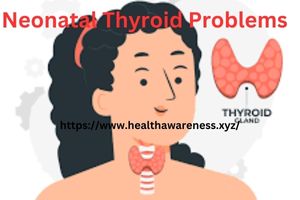Neonatal Thyroid Problems
Thyroid problems in newborns basically mean 'congenital hypothyroidism' or thyroid hormone deficiency. However, in rare cases, neonatal hyperthyroidism can also occur, which is called 'neonatal thyrotoxicosis'.
Thyroid hormone is a very essential substance secreted from the thyroid gland in the body, the lack of which can cause physical and mental disabilities in children. Later treatment does not help.
This hormone is needed for the growth of the baby while still in the mother's womb, so it is important for every pregnant mother to know if she has thyroid problem or not and treat it if necessary. Because, if 'congenital hypothyroidism' is detected in time, it can be completely prevented through treatment.
Whose examination is necessary?
In developed countries, thyroid screening is mandatory for all children. This is because it takes time for symptoms of thyroid deficiency problems to manifest. And when the symptoms appear, the child's intelligence is greatly reduced. In our country where it is not possible to test everyone, it is very important to test those who are at special risk. For example –
If the mother is taking medication for thyroid problems or is iodine deficient.
If someone in the family has a congenital thyroid problem. After birth, the newborn has late black stools. If the baby's jaundice lasts more than 2 weeks.
If the baby has any symptoms of Down syndrome and thyroid problems in the baby.
When Diagnosis:
According to various guidelines, all babies should be screened with cord blood or blood TSH within 72 hours after birth. Apart from this, in the case of low birth weight and very sick newborns, re-examination should be confirmed after seven days or if they are somewhat healthy.
However, in the context of our country, it is best to test FTFOR and TSH at three-four day intervals to diagnose thyroid problems in newborns at risk. Also, any child with any symptoms of thyroid problems should be tested immediately.
Treatment
If congenital hypothyroidism is diagnosed, levothyroxine should be administered promptly without delay. In most cases, the medication must be continued for life. Dosage varies from patient to patient, but can be initially started at 10-15 micrograms per kg of body weight up to 1 month of age.
However, if necessary, the expert doctor will diagnose the exact cause by conducting further tests and adjust the dosage of the medicine after testing at certain time intervals. It should be remembered that any medicine has side effects, so it must be followed regularly according to the doctor's advice.

Post a Comment